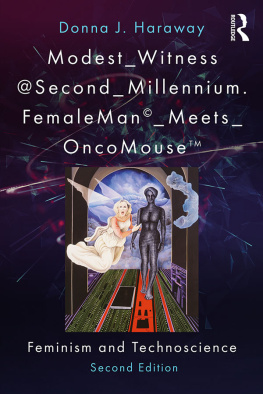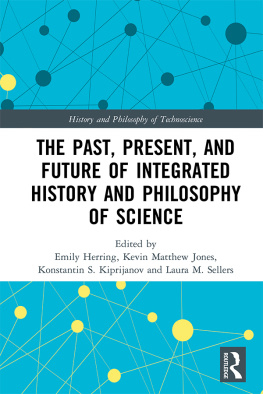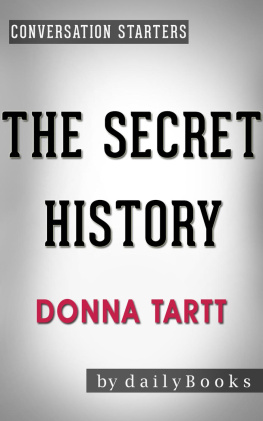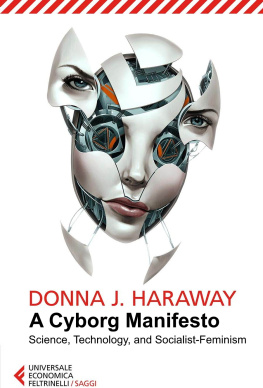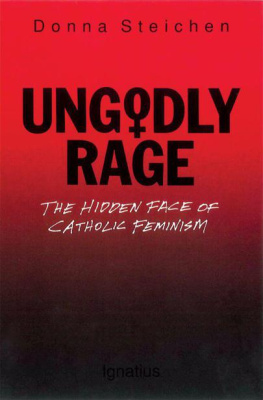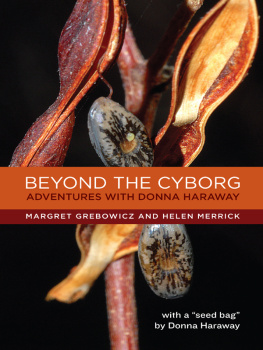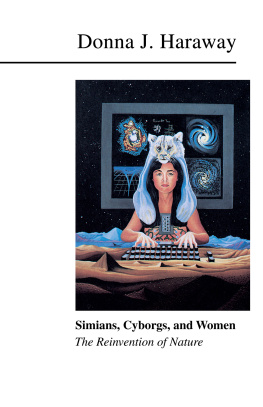Modest_Witness@Second_Millennium.
FemaleMan_Meets_OncoMouseTM
Second Edition
Modest_Witness@Second_Millenium.FemaleMan_Meets_OncoMouse explores the roles of stories, figures, dreams, theories, facts, delusions, advertising, institutions, economic arrangements, publishing practices, scientific advances, and politics in modern technoscience. The books title is an e-mail address. With it, Haraway locates herself and her readers in a sprawling net of associations more far-flung than the Internet. The address is not a cozy home. There is no innocent place to stand in the world where the books author figure, FemaleMan, encounters DuPonts controversial laboratory rodent, OncoMouseTM. This 20th anniversary edition includes a new interview with Haraway, as well as a teaching guide and discussion questions updated for the 21st century.
One of the founders of the posthumanities, Donna J. Haraway is Distinguished Professor Emerita in the History of Consciousness Department at the University of California, Santa Cruz, USA. Author of many books and widely read essays, including the now-classic essay The Cyborg Manifesto, she received the J.D. Bernal Prize in 2000, a lifetime achievement award from the Society for Social Studies of Science.
Thyrza Nicholas Goodeve is a professor of Art History at the School of Visual Arts, New York City, USA, and Senior Art Editor for the Brooklyn Rail.
Modest_Witness@
Donna J.
Preface and Study Guide by
Thyrza Nichols Goodeve
With paintings by Lynn M. Randolph
Second_Millennium.
FemaleMan_Meets_OncoMouseTM
FEMINISM AND TECHNOSCIENCE

Haraway
Second Edition

Second edition published 2018
by Routledge
711 Third Avenue, New York, NY 10017
and by Routledge
2 Park Square, Milton Park, Abingdon, Oxon OX14 4RN
Routledge is an imprint of the Taylor & Francis Group, an informa business
2018 Taylor & Francis
The right of Donna J. Haraway to be identified as the author of this work has been asserted by her in accordance with sections 77 and 78 of the Copyright, Designs and Patents Act 1988.
All rights reserved. No part of this book may be reprinted or reproduced or utilised in any form or by any electronic, mechanical, or other means, now known or hereafter invented, including photocopying and recording, or in any information storage or retrieval system, without permission in writing from the publishers.
Trademark notice: Product or corporate names may be trademarks or registered trademarks, and are used only for identification and explanation without intent to infringe.
First edition published 1997 by Routledge
Library of Congress Cataloging-in-Publication Data
Names: Haraway, Donna Jeanne, author.
Title: Modest-Witness@Second-Millennium.FemaleMan-Meets-OncoMouse : feminism and technoscience / Donna J. Haraway ; with paintings by Lynn M. Randolph.
Description: Second edition. | New York, NY : Routledge, 2018. | The title is an email address. On t.p. the hyphens are subscript; FemaleMan OncoMouseTM. | Includes bibliographical references and index.
Identifiers: LCCN 2018003444 | ISBN 9781138303409 (hardback) | ISBN 9781138303416 (pbk.) | ISBN 9780203731093 (ebook)
Subjects: LCSH: Feminist theory. | Feminist criticism. | TechnologySocial aspects. | ScienceSocial aspects. | Computers and civilization.
Classification: LCC HQ1190 .H37 2018 | DDC 305.42dc23
LC record available at https://lccn.loc.gov/2018003444
ISBN: 978-1-138-30340-9 (hbk)
ISBN: 978-1-138-30341-6 (pbk)
ISBN: 978-0-203-73109-3 (ebk)
Typeset in Bembo
by Apex CoVantage, LLC
Front Cover: Lynn Randolph, The Annunciation of the Second Coming, oil on canvas, 58 x 64, 1996.
Lynn Randolphs angel, painted according to Renaissance conventions except for her transparent wings, announces not the birth of Christ, but the warning that life on earth is changing irrevocably. On the right hand of the painting, a cosmic galaxy made of a giant DNA molecule echoes the angels message. Striding through the stylized fifteenth-century Italian colonnade along the pathway of a computer circuit board, the classical and statuesque electronic goddess carries in her troubling body both a threat and a promise. She is a matrix, one who is pregnant with contradictions, emergencies, delusions, and hopes of colliding sociotechnical worlds.
For Rusten
Contents
S EMANTICS : Modest_Witness@Second__Millennium.
FemaleMan_Meets_OncoMouse
A book is a visible sign of the contributions of an extended web of colleagues; friends (human and animal); students; antagonists; and workers of all sorts in libraries, publishing houses, laboratories, corporations, funding institutions, and classrooms. It is not possible to acknowledge all the gifts of ideas, time, liveliness, disagreements, references, shared passions, bits of language, visual images, political commitment, food, money, jobs, travel, and much else that I have received from the networks of people who made this book possible. But I want to try to name a few of the people and institutions and hope that their names can stand for all others to whom I feel connected in this project.
First, the paintings by Lynn M. Randolph in this book are part of an ongoing traffic between us in images, ideas, and hopes. Her art has been an extraordinary intellectual and physical gift.
I remain in awe of my colleagues, students, and co-workers at the University of California at Santa Cruz, my academic home since 1980. I owe special thanks to Sheila Peuse, Billie Harris, Alexandra Armstrong, Sylvia Holmes, and Kathy Durcan. Co-teaching with Dana Takagi and Anna Tsing was a special privilege. My department is made up of scholars and friends who have changed my life and mind repeatedly. Thanks to Victor Burgin, Jim Clifford, Angela Davis, Teresa deLauretis, Barbara Epstein, Gary Lease, and Hayden White.
Graduate students shape my thinking profoundly; their influence extends long after they leave UCSC. Despite my efforts carefully and conspicuously to cite oral, unpublished, and published works by students, more than once I have found myself credited for an idea or argument that germinated with a graduate student in a seminar or discussion in my office. Intellectual work flourishes in webs; writing is always a conversation, hidden or not; and ideas should not be owned. My title word FemaleMan points to a joke, a fact, and a debt. Although I am conscious of many more present and past students inhabiting these pages, I can name here only those I worked with closely who have finished their Ph.D.s since my last book was published in 1991: Elizabeth Bird, Megan Boler, Nancy Campbell, Laura Chernaik, Giovanna Di Chiro, Julia Creet, Vince Diaz, Joseph Dumit, Ron Eglash, Eric Engles, Julia Erhart, Ramona Fernandez, Sharon Ghamari-Tabrizi, Thyrza Goodeve, Chris Gray, John Hartigan, Mary John, Laura Hyun-Yi Kang, Lorraine Kenny, Valerie Kuletz, Melissa Matthes, Yoshiko Miyake, Chla Sandoval, Victoria Smith, Alluquere Stone, Marita Sturken, Nol Sturgeon, Jennifer Terry, and Sarah Williams. Joanne Barker, Julian Bleecker, Claudia Castaeda, Marcy Darnovsky, Ilene Feinman, Barbara Ige, Yvonne Keller, and Anjie Rosga are poised to finish as I write this acknowledgment. Cori Hayden and Brendan Brisker generously let me use unpublished papers. I am also grateful to doctoral students outside UCSC on whose dissertation committees I have served since 1991: Monica Casper, Alex Chasin, Charis Cussins, and Deborah Davis.

